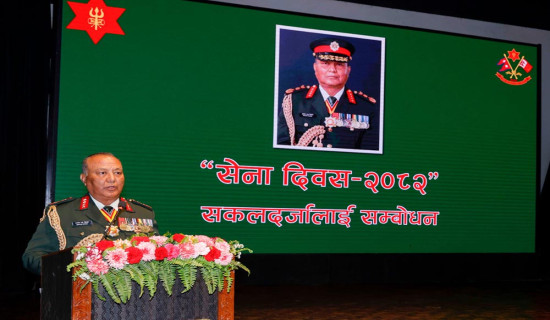- Saturday, 14 February 2026
Strengthen UN Peacekeeping Missions
Nepal joined the United Nations in 1955. The country has been regularly taking part in annual general assembly sessions of the UN since then. The country is in favour of maintaining peace around the world. That is why, during the Panchayat regime, king Birendra proposed that Nepal be declared a zone of peace. The proposal was garnering support from one nation after the other when the Panchayat regime collapsed in 1990. With the reintroduction of multi-party democracy, the peace zone proposal vanished into thin air. However, some present-day leaders sometimes talk about reviving the peace zone proposal.
Three years after joining the United Nations, Nepal made its presence felt in the UN peacekeeping missions by participating in the United Nations Observation Group in Lebanon (UNOGIL) as a military observer. The country has been regularly participating in the peacekeeping missions since then while contributing to the peacekeeping missions by sending troops, staff or commanders to conflict zones.
Conflict zones
The three security agencies of Nepal – the Nepal Army, the Nepali Police and the Armed Police Force – are involved in the peacekeeping missions. Out of these, the contributions of the Nepal Army preponderate over those of the Nepali Police or the Armed Police Force. Sometimes, civilian administrators and technical staff also help the peacekeeping missions. They work there at individual capacities or on secondment from the government.
According to the Nepal Army, the Purano Gorkha Battalion was the first Nepali contingent to be deployed to the United Nations Emergency Force (UNEF II), Egypt in 1974. Nepali security personnel have been deployed to various conflict zones around the world such as Burundi, Central African Republic, Congo, Cyprus, Ethiopia, Eritrea, Haiti, Israel, Kosovo, Kuwait, Lebanon, Macedonia, Mali, South Sudan, Sudan, Syria, Timor-Leste, Western Sahara and Yemen. Nepal has contributed troops, force commanders or military observers to the peacekeeping operations in the aforesaid nations, sending around 150,000 military and police personnel to the peacekeeping missions, covering around 45 missions. The number of female security personnel constitutes around ten per cent of the total personnel. Nepal is trying to increase the number of female security personnel.
As per the Office of the UN Peacekeeping Operations, Nepal had the largest contribution of troops by November 30, 2023 in terms of deployment of both military and police personnel. By the same date, as many as 6,247 military and police personnel were serving in various conflict zones. Further, 42 officials from the Nepal Army and the Nepali Police were working as experts in various conflict zones. Senior military officials have served in higher positions as heads of missions, force commanders, deputy force commanders, planning officers, assessment officers, military training officers, sector commanders, task force commanders and military advisors. However, Nepal has asked the United Nations to open more senior positions for Nepal in the peacekeeping missions.
Nepali peacekeepers have accepted challenges to the disruption of peace around the world. As Nepali security personnel deployed to the peacekeeping missions want peace, they have not hesitated to move to conflict zones, carrying their life in their hands. That is why, Nepali peacekeepers are extolled all over the world for their gallantry. Further, the name Gurkha itself is a synonym for bravery: Nepal is famous as the land of the Gurkhas all over the world.
Nepal has a zero tolerance policy on sexual abuse and exploitation while in the peacekeeping missions. As such, the country adheres to the UN policies on sexual abuse and exploitation and on the protection of human rights. Violations of human rights such as rape, murder and torture are crimes against humanity. Nepali peacekeepers have an ear to the ground lest such violations occur. It goes without saying that Nepal always wants peace and harmony in the world. That is why, the country has been supporting the peacekeeping missions whole-heartedly. The country has also suffered casualties: around 75 Nepali peacekeepers have attained martyrdom and around 70 have been wounded while in the line of duty of maintaining international peace and security.
In the present-day world, the need for maintaining peace and security has been felt on an unprecedented scale. The Russia-Ukraine war has been raging since February 2022. Likewise, the Israel-Hamas war has been going on since October 2023. In recent times, Israel is at war with Hezbollah militants. Israel is also occasionally at war with Houthis. Despite efforts by various countries to effect a ceasefire in these conflict zones, there is no sign in sight that the wars will come to a halt anytime soon.
Peaceful coexistence
The Middle East war and the Ukraine war have sent a strong message that the world is volatile and that the United Nations should take strident measures to halt the wars. As a result of the wars, hundreds of thousands people are suffering for no fault of theirs. The recent Israeli strikes on UN peacekeeping forces in Lebanon have shown how vulnerable the peacekeeping missions are. Although Israel has drawn flak from the United Nations and UNIFIL-contributing countries, including Nepal, it was like water off a duck’s back for Israel.
Anyway, peace is a prerequisite in today’s restive world. Peace can also be taken as one of the fundamental rights of people. Every person should have the right to peaceful living. Nepal is a country that takes peaceful coexistence as one of the fundamental principles of the Panchasheel. As a member of the Non-Aligned Movement, the country has been advocating peace and harmony in the world. Nepal’s participation in the peacekeeping missions is testimony to this. However, the United Nations itself ought to be active in maintaining peace by taking concrete measures to bring the raging wars in Gaza, Ukraine and Lebanon to a halt.
(Maharjan has been regularly writing on contemporary issues for this daily since 2000.)
















